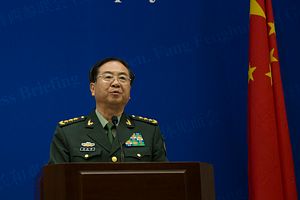On February 20, China’s state news agency Xinhua announced that Fang Fenghui, former chief of staff of China’s Central Military Commission (CMC) Joint Staff Department, was sentenced to life in prison for bribery.
With only one sentence, Xinhua’s announcement was extremely brief. It said that Fang was found guilty by “a military court” on a total of three crimes, including “accepting and offering bribes and holding a huge amount of property from unidentified sources.”
Other than being sentenced to life imprisonment, Fang was also “deprived of his political rights for life and had his personal properties confiscated.”
His “illicit money and properties confiscated will be turned over to the state coffers,” according to the court ruling.
As The Diplomat has been closely following, former General Fang, 67, used to be a member of the CMC — the highest body that controls the Chinese military.
Before his fall, Fang had maintained a high profile in the military. In April 2017, Fang got the opportunity to accompany Chinese President Xi Jinping to visit Florida and met U.S. President Donald Trump at Trump’s Mar-a-Lago estate. Even in August 2017, he still represented the Chinese military to meet with Joseph Dunford, chairman of the U.S. Joint Chiefs of Staff, in Beijing and discussed the North Korean crisis.
Yet, one month later, he was found to be excluded from attending the the Chinese Communist Party’s (CCP) 19th National Congress — a significant signal that his career had come to an end.
In January 2018, Xinhua finally made public that Fang had been “transferred to the military prosecution authority on suspicion of offering and accepting bribes.”
In October 2018, Fang was officially expelled from the CCP and also stripped of his military rank.
Xinhua’s official statement announcing his expulsion was unusually harsh. Fang was accused of being “two-faced,” “disloyal and dishonest to the Party,” and “corrupted in politics and greedy in wealth,” and having “seriously violated the Party’s political discipline and political rules.”
The statement said that on “suspicion of offering and accepting bribes,” Fang had “huge amount of unexplained wealth.”
The statement also used superlative language to describe Fang’s problems: Fang’s circumstances were “extremely serious;” the amount of his unexplained wealth was “extremely large;” and the impact of Fang’s case was “extremely bad.”
However, the latest statement, by contrast, avoided all the significant details of Fang’s case — particularly the exact amount of the bribes Fang accepted and offered, the exact amount of unidentified property Fang was holding, and the exact amount of Fang’s personal properties the state has confiscated. In fact, these facts are exactly what the Chinese public has been most eager to know.
For years, the Chinese public has been demanding financial disclosures by public servants, but the Chinese authorities continue to turn a deaf ear.
It’s likely that the amount of Fang’s unexplained wealth is so large that the Chinese authorities can’t make it public, because the truth would have a negative impact to the already-unsatisfied Chinese public.

































